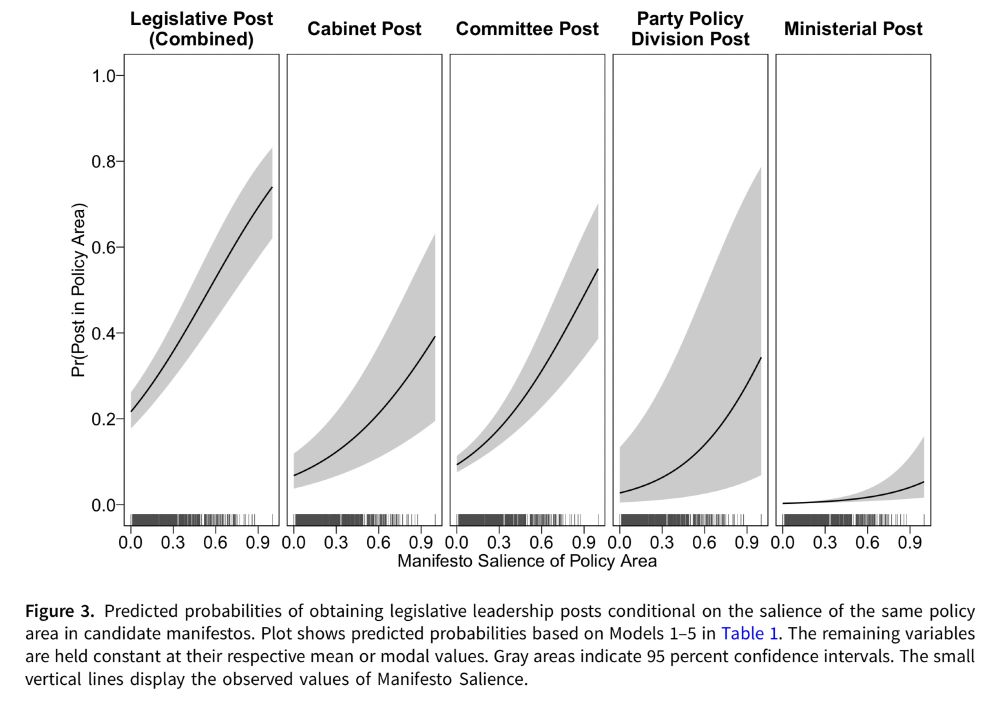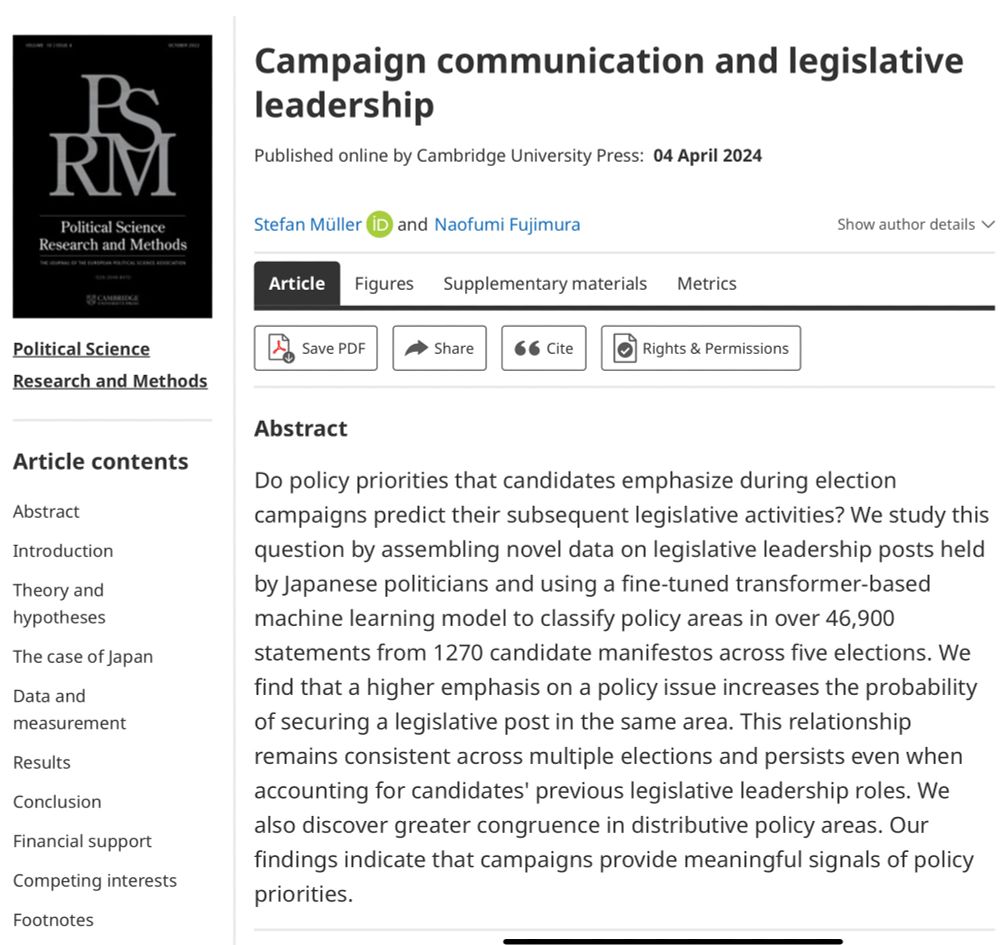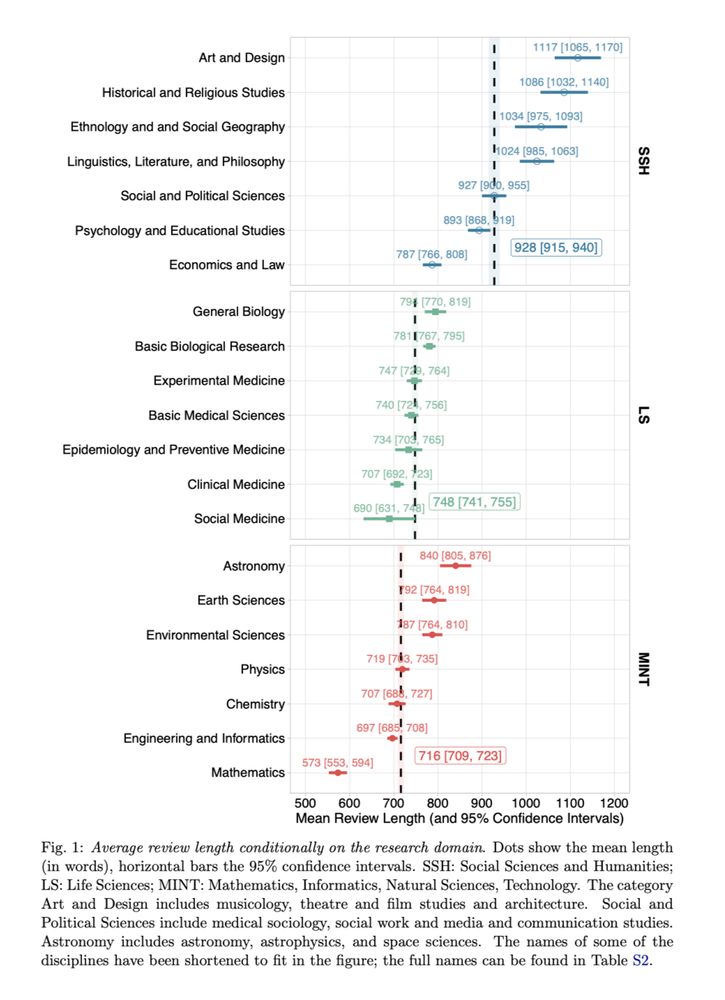
Stefan Müller
@stefanmueller.bsky.social
Associate Professor @ucddublin.bsky.social • party competition, public opinion, political communication, computational social science • Maintainer @irishpollingind.bsky.social • Executive Committee Member @yai.ie
muellerstefan.net
muellerstefan.net
Really important and insightful analysis of the voters who spoiled their ballots in the presidential election.
@kevcunningham.bsky.social also classifies open-ended survey responses to better understand the underlying reasons and motivations.
➡️ open.substack.com/pub/kevcunni...
@kevcunningham.bsky.social also classifies open-ended survey responses to better understand the underlying reasons and motivations.
➡️ open.substack.com/pub/kevcunni...




October 29, 2025 at 1:39 PM
Really important and insightful analysis of the voters who spoiled their ballots in the presidential election.
@kevcunningham.bsky.social also classifies open-ended survey responses to better understand the underlying reasons and motivations.
➡️ open.substack.com/pub/kevcunni...
@kevcunningham.bsky.social also classifies open-ended survey responses to better understand the underlying reasons and motivations.
➡️ open.substack.com/pub/kevcunni...
Reasons for vote choice according to the Ireland Thinks polling day poll ⤵️
#Aras25
analysis.irelandthinks.ie/polling-day-...
@kevcunningham.bsky.social
#Aras25
analysis.irelandthinks.ie/polling-day-...
@kevcunningham.bsky.social

October 25, 2025 at 11:10 AM
Reasons for vote choice according to the Ireland Thinks polling day poll ⤵️
#Aras25
analysis.irelandthinks.ie/polling-day-...
@kevcunningham.bsky.social
#Aras25
analysis.irelandthinks.ie/polling-day-...
@kevcunningham.bsky.social
📊 @kevcunningham.bsky.social is publishing findings from the Ireland Thinks polling day poll at analysis.irelandthinks.ie


October 25, 2025 at 10:37 AM
📊 @kevcunningham.bsky.social is publishing findings from the Ireland Thinks polling day poll at analysis.irelandthinks.ie
There goes the paper on support for Jim Gavin among those interested in Gaelic games in Dublin versus rival counties.
Liam Kneafsey and I successfully applied for including these questions in the Irish Presidential Election Study, and we completed the pre-analysis plan and code last week. 😬😢
Liam Kneafsey and I successfully applied for including these questions in the Irish Presidential Election Study, and we completed the pre-analysis plan and code last week. 😬😢

October 6, 2025 at 10:28 AM
There goes the paper on support for Jim Gavin among those interested in Gaelic games in Dublin versus rival counties.
Liam Kneafsey and I successfully applied for including these questions in the Irish Presidential Election Study, and we completed the pre-analysis plan and code last week. 😬😢
Liam Kneafsey and I successfully applied for including these questions in the Irish Presidential Election Study, and we completed the pre-analysis plan and code last week. 😬😢
New paper in Computational Communication Research with James Cross, @derekgreene.bsky.social & Martijn Schoonvelde: “Mapping Digital Campaign Strategies: How Political Candidates Use Social Media to Communicate Constituency Connection and Policy Stance”
PDF (open access): doi.org/10.5117/CCR2...
PDF (open access): doi.org/10.5117/CCR2...

September 17, 2025 at 10:41 AM
New paper in Computational Communication Research with James Cross, @derekgreene.bsky.social & Martijn Schoonvelde: “Mapping Digital Campaign Strategies: How Political Candidates Use Social Media to Communicate Constituency Connection and Policy Stance”
PDF (open access): doi.org/10.5117/CCR2...
PDF (open access): doi.org/10.5117/CCR2...
Are you a @ucdpolitics.bsky.social graduate? Join our discussion event on the upcoming presidential election.
🎙️ Panelists: @kevinrafter.bsky.social, Art O'Leary & Sheila Naughton
🗓️ 30 Sept, 18:30
📍 Museum of Literature Ireland
Register here: docs.google.com/forms/d/e/1F...
@ucddublin.bsky.social
🎙️ Panelists: @kevinrafter.bsky.social, Art O'Leary & Sheila Naughton
🗓️ 30 Sept, 18:30
📍 Museum of Literature Ireland
Register here: docs.google.com/forms/d/e/1F...
@ucddublin.bsky.social

September 16, 2025 at 10:15 AM
Are you a @ucdpolitics.bsky.social graduate? Join our discussion event on the upcoming presidential election.
🎙️ Panelists: @kevinrafter.bsky.social, Art O'Leary & Sheila Naughton
🗓️ 30 Sept, 18:30
📍 Museum of Literature Ireland
Register here: docs.google.com/forms/d/e/1F...
@ucddublin.bsky.social
🎙️ Panelists: @kevinrafter.bsky.social, Art O'Leary & Sheila Naughton
🗓️ 30 Sept, 18:30
📍 Museum of Literature Ireland
Register here: docs.google.com/forms/d/e/1F...
@ucddublin.bsky.social
Some of the findings:
– Quality of training data is more important than quantity
– Separate binary classifiers performed best
– Grant peer review is much more positive than negative
We are now working on substantive applications (see thread below).
Classifiers: huggingface.co/snsf-data
– Quality of training data is more important than quantity
– Separate binary classifiers performed best
– Grant peer review is much more positive than negative
We are now working on substantive applications (see thread below).
Classifiers: huggingface.co/snsf-data




September 3, 2025 at 9:11 AM
Some of the findings:
– Quality of training data is more important than quantity
– Separate binary classifiers performed best
– Grant peer review is much more positive than negative
We are now working on substantive applications (see thread below).
Classifiers: huggingface.co/snsf-data
– Quality of training data is more important than quantity
– Separate binary classifiers performed best
– Grant peer review is much more positive than negative
We are now working on substantive applications (see thread below).
Classifiers: huggingface.co/snsf-data
Our paper “A Supervised Machine Learning Approach for Assessing Grant Peer Review Reports” has been accepted at Quantitative Science Studies.
We present a workflow and fine-tuned transformer models to analyse grant peer review reports at scale.
Paper (open access): doi.org/10.1162/qss....
We present a workflow and fine-tuned transformer models to analyse grant peer review reports at scale.
Paper (open access): doi.org/10.1162/qss....

September 3, 2025 at 9:11 AM
Our paper “A Supervised Machine Learning Approach for Assessing Grant Peer Review Reports” has been accepted at Quantitative Science Studies.
We present a workflow and fine-tuned transformer models to analyse grant peer review reports at scale.
Paper (open access): doi.org/10.1162/qss....
We present a workflow and fine-tuned transformer models to analyse grant peer review reports at scale.
Paper (open access): doi.org/10.1162/qss....
Pleased to announce the Connected_Politics Lab Autumn Seminars:
– @profdansmith.bsky.social & Nam Pham
– Eoghan Cunningham @ucdpolitics.bsky.social
– Elissa Berwick @mcgill.ca
– @jbslapin.bsky.social
– @sabrinabarias.bsky.social
– @dpzollinger.bsky.social
All welcome!
www.ucd.ie/connected_po...
– @profdansmith.bsky.social & Nam Pham
– Eoghan Cunningham @ucdpolitics.bsky.social
– Elissa Berwick @mcgill.ca
– @jbslapin.bsky.social
– @sabrinabarias.bsky.social
– @dpzollinger.bsky.social
All welcome!
www.ucd.ie/connected_po...

August 25, 2025 at 11:21 AM
Pleased to announce the Connected_Politics Lab Autumn Seminars:
– @profdansmith.bsky.social & Nam Pham
– Eoghan Cunningham @ucdpolitics.bsky.social
– Elissa Berwick @mcgill.ca
– @jbslapin.bsky.social
– @sabrinabarias.bsky.social
– @dpzollinger.bsky.social
All welcome!
www.ucd.ie/connected_po...
– @profdansmith.bsky.social & Nam Pham
– Eoghan Cunningham @ucdpolitics.bsky.social
– Elissa Berwick @mcgill.ca
– @jbslapin.bsky.social
– @sabrinabarias.bsky.social
– @dpzollinger.bsky.social
All welcome!
www.ucd.ie/connected_po...
Andy Eggers (@aeggers.bsky.social) and I are co-chairing the Political Methodology section for EPSS 2026 in Belfast.
Please submit a paper, full panel proposals, or suggestions for alternative formats (such as roundtables and lightning rounds).
➡️ epssnet.org/belfast-2026...
@epssnet.bsky.social
Please submit a paper, full panel proposals, or suggestions for alternative formats (such as roundtables and lightning rounds).
➡️ epssnet.org/belfast-2026...
@epssnet.bsky.social

August 5, 2025 at 1:59 PM
Andy Eggers (@aeggers.bsky.social) and I are co-chairing the Political Methodology section for EPSS 2026 in Belfast.
Please submit a paper, full panel proposals, or suggestions for alternative formats (such as roundtables and lightning rounds).
➡️ epssnet.org/belfast-2026...
@epssnet.bsky.social
Please submit a paper, full panel proposals, or suggestions for alternative formats (such as roundtables and lightning rounds).
➡️ epssnet.org/belfast-2026...
@epssnet.bsky.social
Excellent initiative: The Irish Presidential Election Study (2025) seeks proposals for questions on Irish elections & democracy.
– 3 waves: campaign, election week, post-election
– Submit proposal incl. theory and evidence to Gail McElroy
– Deadline: 12 Sept 2025
@psaireland.bsky.social
neds.ie
– 3 waves: campaign, election week, post-election
– Submit proposal incl. theory and evidence to Gail McElroy
– Deadline: 12 Sept 2025
@psaireland.bsky.social
neds.ie

July 22, 2025 at 8:18 AM
Excellent initiative: The Irish Presidential Election Study (2025) seeks proposals for questions on Irish elections & democracy.
– 3 waves: campaign, election week, post-election
– Submit proposal incl. theory and evidence to Gail McElroy
– Deadline: 12 Sept 2025
@psaireland.bsky.social
neds.ie
– 3 waves: campaign, election week, post-election
– Submit proposal incl. theory and evidence to Gail McElroy
– Deadline: 12 Sept 2025
@psaireland.bsky.social
neds.ie
The uncorrected proofs have arrived!
Gallagher, O‘Malley, and @theresareidy.bsky.social: “How Ireland Voted 2024 – The New Normal?”
📘 link.springer.com/book/9783031...
Gallagher, O‘Malley, and @theresareidy.bsky.social: “How Ireland Voted 2024 – The New Normal?”
📘 link.springer.com/book/9783031...


July 19, 2025 at 6:20 AM
The uncorrected proofs have arrived!
Gallagher, O‘Malley, and @theresareidy.bsky.social: “How Ireland Voted 2024 – The New Normal?”
📘 link.springer.com/book/9783031...
Gallagher, O‘Malley, and @theresareidy.bsky.social: “How Ireland Voted 2024 – The New Normal?”
📘 link.springer.com/book/9783031...
Paper (open access): doi.org/10.1017/psrm...
Replication materials and digitised manifestos: doi.org/10.7910/DVN/...
7/7
Replication materials and digitised manifestos: doi.org/10.7910/DVN/...
7/7

July 15, 2025 at 7:43 AM
Paper (open access): doi.org/10.1017/psrm...
Replication materials and digitised manifestos: doi.org/10.7910/DVN/...
7/7
Replication materials and digitised manifestos: doi.org/10.7910/DVN/...
7/7
Second key finding: Congruence is higher for distributive policy areas and for issues deemed less important, based on expert survey assessments. These results suggest that campaigns function as meaningful signals of future legislative priorities.
6/7
6/7


July 15, 2025 at 7:43 AM
Second key finding: Congruence is higher for distributive policy areas and for issues deemed less important, based on expert survey assessments. These results suggest that campaigns function as meaningful signals of future legislative priorities.
6/7
6/7
First key finding: A stronger focus on a policy issue during the campaign significantly increases the probability of securing a legislative leadership post in that area.
This pattern is robust across modelling choices and measures of issue emphasis, and it holds for every election.
5/7
This pattern is robust across modelling choices and measures of issue emphasis, and it holds for every election.
5/7

July 15, 2025 at 7:43 AM
First key finding: A stronger focus on a policy issue during the campaign significantly increases the probability of securing a legislative leadership post in that area.
This pattern is robust across modelling choices and measures of issue emphasis, and it holds for every election.
5/7
This pattern is robust across modelling choices and measures of issue emphasis, and it holds for every election.
5/7
In the next step, we match the emphasis on policy issues with novel data on all legislative leadership posts from 2003 to 2017. The data collected by @profdansmith.bsky.social & Steven Reed allow us to consider many relevant characteristics of MPs in our analyses.
4/7
4/7

July 15, 2025 at 7:43 AM
In the next step, we match the emphasis on policy issues with novel data on all legislative leadership posts from 2003 to 2017. The data collected by @profdansmith.bsky.social & Steven Reed allow us to consider many relevant characteristics of MPs in our analyses.
4/7
4/7
After fine-tuning a transformer machine learning model (Japanese BERT), we classify policy areas within candidate manifestos published between 2003 and 2014. Out-of-sample predictions closely match human coding, and additional tests support their face validity.
3/7
3/7

July 15, 2025 at 7:43 AM
After fine-tuning a transformer machine learning model (Japanese BERT), we classify policy areas within candidate manifestos published between 2003 and 2014. Out-of-sample predictions closely match human coding, and additional tests support their face validity.
3/7
3/7
Do candidates’ policy priorities during election campaigns predict their legislative activities? Our study focuses on Japanese politicians, combining new data on legislative posts with over 46,000 statements from 1,270 candidate manifestos across five elections.
2/7
2/7

July 15, 2025 at 7:43 AM
Do candidates’ policy priorities during election campaigns predict their legislative activities? Our study focuses on Japanese politicians, combining new data on legislative posts with over 46,000 statements from 1,270 candidate manifestos across five elections.
2/7
2/7
‘Campaign Communication and Legislative Leadership’ (with Naofumi Fujimura) appeared in the latest issue of Political Science Research and Methods.
Paper (open access): doi.org/10.1017/psrm...
@psrm.bsky.social
Thread below 🧵 1/7
Paper (open access): doi.org/10.1017/psrm...
@psrm.bsky.social
Thread below 🧵 1/7

July 15, 2025 at 7:43 AM
‘Campaign Communication and Legislative Leadership’ (with Naofumi Fujimura) appeared in the latest issue of Political Science Research and Methods.
Paper (open access): doi.org/10.1017/psrm...
@psrm.bsky.social
Thread below 🧵 1/7
Paper (open access): doi.org/10.1017/psrm...
@psrm.bsky.social
Thread below 🧵 1/7
Received a complimentary copy of “Foundations of European Politics” after commenting on new chapters. Such a good textbook: clear theory, empirical evidence, and free interactive data exercises.
@catherinedevries.bsky.social @sarahobolt.bsky.social @sopro.bsky.social @jbslapin.bsky.social
@catherinedevries.bsky.social @sarahobolt.bsky.social @sopro.bsky.social @jbslapin.bsky.social




July 3, 2025 at 11:48 AM
Received a complimentary copy of “Foundations of European Politics” after commenting on new chapters. Such a good textbook: clear theory, empirical evidence, and free interactive data exercises.
@catherinedevries.bsky.social @sarahobolt.bsky.social @sopro.bsky.social @jbslapin.bsky.social
@catherinedevries.bsky.social @sarahobolt.bsky.social @sopro.bsky.social @jbslapin.bsky.social
Results from regression models correspond to the descriptive findings. Female reviewers focus more on all evaluation criteria and are more positive. Female applicants receive slightly more positive and less negative reviews than male applicants. Differences by research domain are substantive.
10/12
10/12

July 2, 2025 at 8:08 AM
Results from regression models correspond to the descriptive findings. Female reviewers focus more on all evaluation criteria and are more positive. Female applicants receive slightly more positive and less negative reviews than male applicants. Differences by research domain are substantive.
10/12
10/12
The differences in positive/negative statements across disciplines are fascinating. Reviews in MINT disciplines are much more positive and much less negative than reviews in LS and SSH.
8/12
8/12

July 2, 2025 at 8:08 AM
The differences in positive/negative statements across disciplines are fascinating. Reviews in MINT disciplines are much more positive and much less negative than reviews in LS and SSH.
8/12
8/12
Next, we turn to the review content. We classify over 1.3 million sentences across the four SNSF evaluation criteria as well as sentiment. The table below shows “typical” words for each content category. We then aggregate the prevalence of each category to the level of review reports.
6/12
6/12

July 2, 2025 at 8:08 AM
Next, we turn to the review content. We classify over 1.3 million sentences across the four SNSF evaluation criteria as well as sentiment. The table below shows “typical” words for each content category. We then aggregate the prevalence of each category to the level of review reports.
6/12
6/12
We find that female reviewers write considerably longer reviews than male reviewers across all research domains.
Female reviewers also receive somewhat longer reports than male reviewers, especially in SSH.
5/12
Female reviewers also receive somewhat longer reports than male reviewers, especially in SSH.
5/12


July 2, 2025 at 8:08 AM
We find that female reviewers write considerably longer reviews than male reviewers across all research domains.
Female reviewers also receive somewhat longer reports than male reviewers, especially in SSH.
5/12
Female reviewers also receive somewhat longer reports than male reviewers, especially in SSH.
5/12
Let’s start with review length: reviews in the Social Sciences and Humanities (SSH) are considerably longer than reviews in the Life Sciences (LS) and MINT (Mathematics, Informatics, Natural Sciences, Technology). The plot below underscores these substantive differences across disciplines.
4/12
4/12

July 2, 2025 at 8:08 AM
Let’s start with review length: reviews in the Social Sciences and Humanities (SSH) are considerably longer than reviews in the Life Sciences (LS) and MINT (Mathematics, Informatics, Natural Sciences, Technology). The plot below underscores these substantive differences across disciplines.
4/12
4/12

